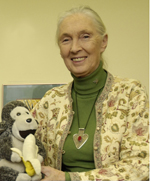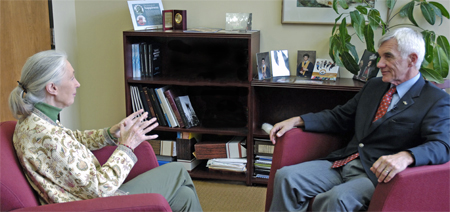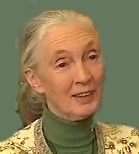Jane Goodall: Making a Difference Every Day
Dr. Jane Goodall, one of the world's most recognized scientists, thinks she emerged from the womb interested in animals. “I was totally fascinated by all of living things,” she told Dr. Alan Wright, Vice-Provost, Teaching and Learning, in an on-campus interview during her visit to Windsor. Describing her childhood aspirations to visit Africa as laughable to everyone but her mother, she shared with Dr. Wright the events that took her from her early imaginings to the real-life shores of Lake Tanganyika in East Africa.
Must We Redefine Man?
Goodall’s legendary discoveries began in 1960 in a place that became known as the Gombe Game Reserve in Tanzania. There she lived in the chimpanzees’ environment and worked to gain their confidence. Six months into her observations, Goodall was able to wire the renowned Dr. Louis Leaky that she had observed chimpanzees using and making tools as they supplemented their diets by stripping leaves off twigs to fish termites from a nest. Until then it was thought that only human beings fashioned tools. Upon receiving Goodall’s news, Leakey said, "Now we must redefine tool, redefine man, or accept chimpanzees as humans."
Forty-six years later, scientists are still exploring the biological and behavioural similarities between humans and the rest of the animal kingdom. If nothing else, it has highlighted our arrogance and shown just how poorly we have served as "stewards of this beautiful planet."
The Green Corridor
Dr. Goodall expressed her pleasure when she learned about Windsor’s Green Corridor Project from University President Ross Paul. The project, a partnership including local government, school boards, community groups, artists and engineers, will create a “green corridor” along Huron Church Road extending right into the University campus. While on campus, Goodall planted a tree that will become part of this green area in an industrial urban environment.
Experiential Learning
Wright asked Goodall her opinion on the role the university should play in the future of the planet. The way for students to really learn, she believes, is for the university to give them more chances to go out into the community and see what it is like to work in the real world. Do something meaningful: make it a project to write about, learn how to present it, share it, and talk about it. Goodall also stressed the importance of the university bringing students from around the world to the Windsor campus.
Such exchanges help to highlight the contrasts between being born into poverty or born into wealth. Students need to realize that children born into poverty need a share of the world just as chimpanzee’s need a share of the forest. University can be a time for students to learn how “every individual can make a difference every day.”
Recognizing Links

Dr. Goodall and "friend."
With her experience in Gombe and her global travels, Goodall has come to see chimpanzee needs as similar to human needs. “Somehow it is all linked together,” she says. Society as a whole is very much interconnected, and choices we make in our everyday lives can have an unexpected impact. When bemoaning the sorry state of the world, we often blame our political leaders. Goodall points out that in a democracy we are the ones who vote these people into power, and politicians will not voluntarily make the difficult pro-environment decisions at the expense of corporations to "put the world back on track," unless they know that there is a voting constituency that really wants this to happen.
Similarly, we may want to blame those "dirty" corporations for environmental degradation or for following unethical labour practices. If we choose not to buy from them, if we seek out alternatives, even if it costs a bit more or is a bit more inconvenient, then guilty corporations will eventually begin to cease these practices. Perhaps the poorer among us would find this too difficult, but certainly there are many among us who could afford not to buy. We simply have to make the choice. We need to be more aware of the impact our choices make on the environment, on society, on the poor, on farmers, on the animals driven into smaller and smaller pockets of land for the sake of industrial farming.
The Universities
University communities can help by recognizing and acknowledging the good choices that faculty and students make. It is the ideal place where all the facets of modern society can be used and questioned with regard to their impact, both positively and negatively, on the world we live in. Universities could be a place where the connections between today’s complexities -- industrialization, ecology, law, business, medicine -- of life on this planet can be made clear. Once able to see, students can ask themselves “What difference am I going to make?”
 |
|
Dr. Goodall and Dr. Wright in conversation. |
|---|



 Print
Print
Reader Comments
Add your opinion!
(Sorry, no further comments are accepted for this article. You can contact us at ctl@uwindsor.ca for more information.)